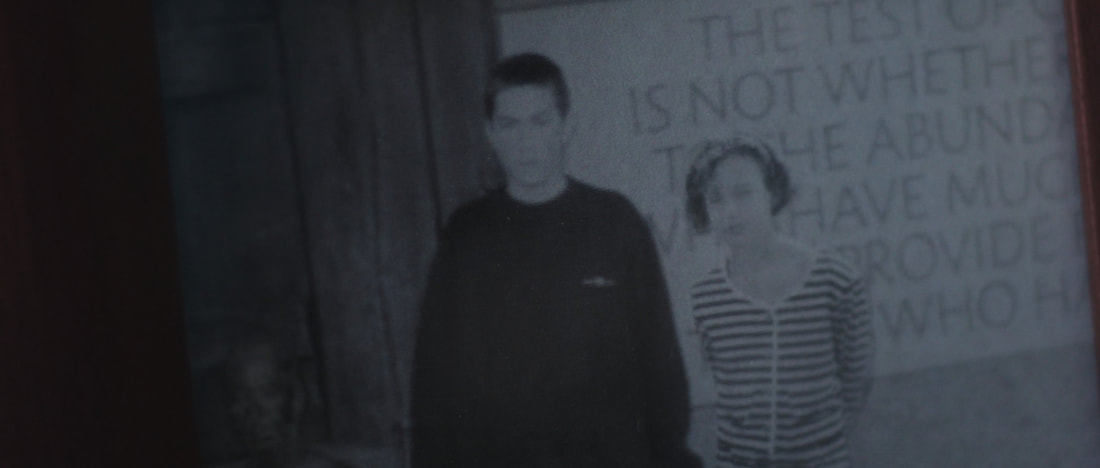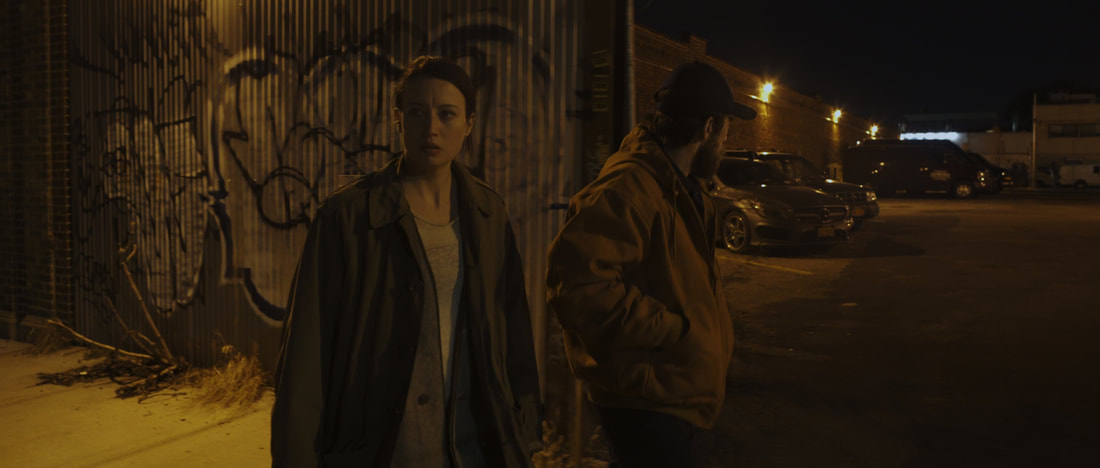|
Do your worst childhood fears ever come back to haunt you? Does it feel like the monsters in your closet never left? Most of us outgrow our fear of shadows, monsters, and the dark, and we can now keep the closest door open at night and venture down the dark basement staircase with ease. But for Daphne and Wilson Shaw (Libby Ewing and Evan Dumouchel), the lead characters in Perry Blackshear’s When I Consume You, the haunting presence that plagued their childhood never left them alone. As the brother and sister grapple with the struggles of adulthood, a slew of mental health issues, and the lasting effects of a bad home life, they’re also haunted by a relentless stalker who has been watching them with malevolent yellow eyes since they were kids. After years of living in fear, Daphne and Wilson decide it’s high time to seek revenge.  L-R: Libby Ewing as Daphne and Evan Dumouchel as Wilson in WHEN I CONSUME YOU. L-R: Libby Ewing as Daphne and Evan Dumouchel as Wilson in WHEN I CONSUME YOU. When I Consume You is the third feature film from writer/director Perry Blackshear and the dynamite cast/production team made up of Libby Ewing, Evan Dumouchel, and MacLeod Andrews. It’s also the second film they’ve brought to the Fantasia International Film Festival (the first was They Look Like People in 2015). After watching When I Consume You, it’s immediately clear why this team continues making movies together. Aside from the fantastic chemistry among the cast (more on that below), When I Consume You is fresh, balanced, and harmonious, reflecting the team members’ individual talents and their shared vision. It’s wacky, creepy, different, and sincere, showing us what can happen when dedicated filmmakers get together to create something they’re genuinely passionate about. One thing that makes When I Consume You so unique is that it dabbles in a number of different genres. It’s clear that when Perry wrote the film, he wasn’t necessarily playing by anyone’s rules. He pieced together a story with influences from the crime, mystery, thriller, horror, revenge, paranormal, and occult genres, adding several genre-bending twists and turns to the plot that make it impossible to tell what’s coming next. When I Consume You is certainly frightening, but it also makes for a fun experience as it celebrates the symbolism and imagery of a handful of horror subgenres. The movie won’t please everyone, and some viewers might feel that the story strays too far from its starting point. With that being said, it’s best to watch When I Consume You with an open mind. The concrete details of the plot and the “mythology” behind the story aren’t the most important things to take away from this film. It’s more about the emotional experience and the way that the story unpacks Daphne and Wilson’s internal conflicts. Sure, the occult and paranormal plot devices could have been more smoothly integrated into the “real world” aspects of the story, but Daphne and Wilson’s emotional journey is so strong that it makes up for the confusing genre-bending plot twists. That emotional journey wouldn’t work without a terrific cast. Ewing, Dumouchel, and Andrews fit their roles so well that you have to assume they had some say in shaping their characters. You can’t help but appreciate the collaboration and teamwork that went into the film, which makes for balanced and well-rounded characters that support the movie’s overall themes. Ewing and Dumouchel not only add dimension and complexity to their individual characters (Daphne and Wilson), but they also have fantastic on-screen chemistry together. While Daphne and Wilson have polar opposite personalities, they share a strong bond developed over years of protecting and fighting for each other. Daphne is tough, bold, and upfront, while Wilson is shy, depressed, and socially awkward. The two characters balance each other out quite nicely, and they also seem very comfortable around each other as they engage in natural, genuine sibling banter. Ewing and Dumouchel are able to show us a strong and believable brother/sister bond without telling us about it directly through their dialogue. The two leads work so well together that they create an underlying sense of hope and joy in an otherwise dark film. Although it’s not at the forefront of the plot, one of the key aspects of Daphne and Wilson’s emotional journey is their strained relationship with their parents. There’s no direct connection between the stalker and the Shaw siblings’ troubled childhood, but Daphne and Wilson reference their harsh upbringing a number of times as they prepare to fight the person who’s been stalking them for years. When I Consume You addresses childhood trauma without directly showing it, focusing instead on the effects it had on Daphne and Wilson’s adult lives and the bond they share because of it. The story places Daphne and Wilson in a web of seemingly unrelated traumatic situations in order to highlight their relationship and the importance of empathy. It celebrates the strength of survivors without glorifying their pain, demonstrating the lasting effects of trauma and personifying the “monsters in the closet” that Daphne and Wilson still face as adults. When I Consume You keeps a lot of balls in the air, juggling a variety of themes without losing track of the story. Perry balances out the film by using several different storytelling techniques, moving from tense, telling dialogue to moments of silence that rely solely on the cast’s acting chops. The most unique technical aspect of the film, however, is the fast and anxious cinematography. The frequent flashbacks, quick editing, point-of-view shots, and use of shaky cam reflect Wilson’s anxious worldview, drawing attention to his sensory experiences. There are moments when this unconventional cinematic style borders on distracting, but it does help us to understand Wilson’s anxiety and the way he processes the world. Even with a few minor flaws, When I Consume You comes out strong thanks to the production team’s creativity and talent. With unique technical aspects that reinforce the themes and conflicts, When I Consume You is a fresh thriller that you won’t likely forget.
0 Comments
Leave a Reply. |
"Our embodied spectator, possibly perverse in her fantasies and diverse in her experience, possesses agency...finally, she must now be held accountable for it." Categories
All
|





